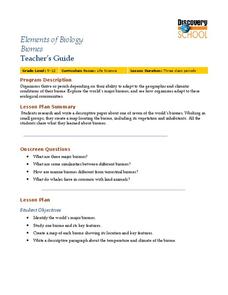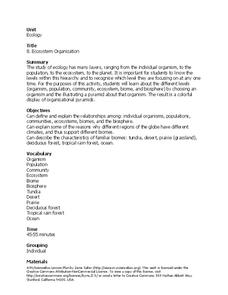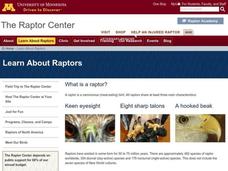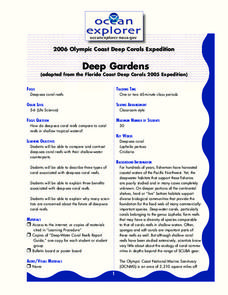Curated OER
Trophic Ecology of Humans
students analyze the place of humans among the tropic levels by observing what we eat. They calculate the caloric content of several foods commonly eaten by humans and calculate the total energy cost to grow, process, transport, store...
Curated OER
Trophic Ecology of Humans
Students analyze the trophic level of humans by first calculating the kilocalories in own their lunch. They then calulate the kilocalories in a wide variety of foods found in grocery stores and compare the kilocalories needed to acquire...
Curated OER
Principles of Ecology
In this ecology worksheet, students will review 10 vocabulary words associated with the basic principles of ecology. This worksheet has 10 fill in the blank questions.
Chicago Botanic Garden
Leaf Litter Ecology Lab
Some organisms spend their entire lives in leaf litter. The third in a series of six is a great lesson exploring the community of leaf litter. Groups gather and then spread leaf litter over white paper and remove leaves/twigs while...
Moorea Coral Reef Long-Term Ecological Research Program
Paper Plate Fishes
Tropical fish make great art projects! Use paper plates to design, color, and assemble round and oval-shaped fish based on photographs of actual fish found along the Moorea Coral Reef. Kids learn about different fins- including the...
Curated OER
Principles of Ecology
In this ecology worksheet, students will fill in a graphic organizer showing the relationship organisms have with their environments and with each other. This includes biotic and abiotic factors, tropic levels, and ecological pyramids....
Curated OER
Species Diversity in Ecosystems with Different Techniques of Land Management
Students visit numerous places to help in their understanding of Ecology. In this biology lesson plan, students will learn about characteristics and how to identify numerous plants and animals. This lesson allows for many field trip...
Curated OER
Plants and Ecosystems
The relationships within and between ecosystems can be explored. after examining an area for living and non-living things students complete the same examination in the forest ecosystem. Students identify abiotic and biotic elements in an...
Curated OER
Guetemala's Changing Forest
Eighth graders compare their local ecological zone to the tropical rainforest. In this natural ecology lesson, 8th graders complete an activity about the differences in ecological zones. They compare their biome to the Guatemalan...
Curated OER
Biomes
Students explore the worlds biomes and see how organisms adapt to these ecological communities. In this world's biomes lesson students research and write a paper about one of the world's biomes.
Curated OER
Ecosystem Organization
Students examine the structure of ecosystems. In this ecology instructional activity, students listen to a lecture on relationships among organisms and biomes. Students use the information to create ecosystem organization pyramids.
Curated OER
Theme: Rain Forests and Planet Ecology
Students expand their knowledge of rain forests and planet ecology through the use of literature and related activities.
Curated OER
Deforestation
Students identify the different tropical rainforests in the world using a map. In this ecology lesson, students describe the different methods of deforestation. They create a memo and present it to class.
Curated OER
My Friend, The Volcano
Students describe the positive impacts of volcanic activity on marine ecosystems. In this volcano lesson students explore the process that causes volcanic activity along the Mariana and Kermadec Island Arcs.
Curated OER
Mangrove Ecology and Adaptations
Students create a plant or animal that would be well adapted to a habitat they selected. They first learn about Mangroves and their specific adaptations that help them survive in their habitat.
Curated OER
Mangrove Ecology & Adaptations
Students creat a plant, animal, or other living organism that would be well adapted to a habitat that they previously selected. First they learn about adaptations of Mangroves.
Curated OER
Corals & Coral Reefs
Students describe a coral reef, how it is formed and its inhabitants. They explain the ecological and economic importance of coral reefs and discuss its present-day threats. Lesson contains adaptations for all levels.
Curated OER
Deep Gardens
Students compare and contrast deep-sea coral reefs with shallow-water coral reefs. For this underwater ecology lesson, students describe three types of coral and explain why scientists are concerned about the future of deep-sea coral.
Curated OER
The Rain Forest
Learners explain the basics of the tropical rain forest ecosystem. They list the four general layers of vegetation found in the tropical rain forest.
Curated OER
The Rain Forest
Students acquire knowledge about the basics of the tropical rain forest ecosystem. They analyze the cause/effect relationship between humans attitudes and behavior and the evnvironment. Students list the four general layers of vegetation...
Curated OER
Layers of the Rainforest
What a great way to discuss the rainforest! Learners discuss the importance of adaptation in the environment and how it is linked to survival. They use critical thinking and inference skills to place animals and insects in the different...
Curated OER
Friendly Volcanoes
Young scholars discuss the benefits of volcanic activity on marine life. They explain the process of tectonic plates.
Curated OER
Deep Gardens
Students investigate the differences and similarities between shallow-water and deep-sea coral reefs. In this coral reef lesson, students research and compare the characteristics of reefs. Students describe various lifeforms...
Curated OER
One Square Meter
Students examine various ecosystems using scientific inquiry. Using the local area, they assess the characteristics and conditions in one square meter. They report their findings in the form of a survey map and data sheet. They...























